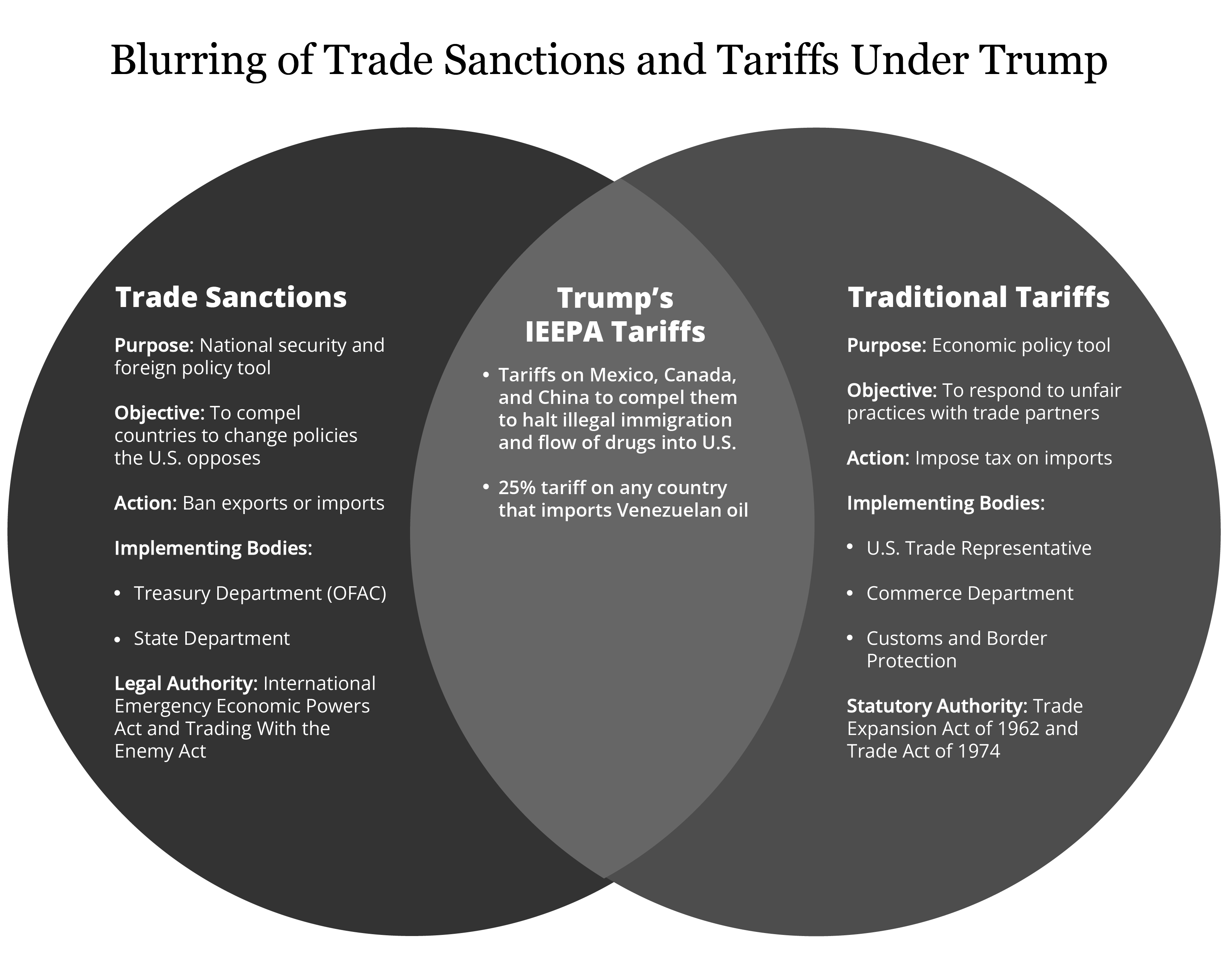Trump’s IEEPA Tariffs
Blurring the Lines Between Trade Sanctions and Traditional Tariffs
📅 May 13, 2025
📅 May 13, 2025
On February 1, 2025, President Trump issued three executive orders directing the United States to impose new tariffs on imports from Mexico, Canada, and China. While the United States has utilized tariffs since its founding in the 18th century, this marked the first time that “IEEPA”—a statute ordinarily used to impose economic sanctions—was cited as the legal basis for implementing tariffs on foreign countries.
The International Emergency Economic Powers Act—or “IEEPA”—underpins nearly all sanctions programs imposed by the U.S. President through executive order. Enacted by Congress in 1977, IEEPA gives the President the authority to investigate, regulate, and prohibit a range of economic activity—including trade—to address any “unusual or extraordinary threat … to the national security, foreign policy, or economy of the United States, if the President declares a national emergency with respect to such threat.” For example, in the wake of 9/11, President Bush signed Executive Order 13224 declaring a national emergency under IEEPA to impose sanctions on al-Qaida and other terrorists and supporters of terrorism.
As shown in the graphic below, trade sanctions have traditionally been used by the United States as a tool of national security or foreign policy to compel countries to change their policies that the U.S. opposes. Trade sanctions typically ban all or specified exports or imports and are implemented primarily by the Treasury Department’s Office of Foreign Assets Control (OFAC). For example, in 2011, President Obama issued Executive Order 13570 declaring a national emergency under IEEPA to prohibit imports into the United States of any goods, services, or technology from North Korea.
Tariffs have traditionally been used as a tool of economic policy to respond to unfair practices with trade partners by imposing a tax on their imports. They are usually imposed under Section 301 of the Trade Act of 1974 once the U.S. Trade Representative (USTR) investigates and determines that an “act, policy, or practice of a foreign country” is unjustifiable or unreasonable and “burdens, restricts, or otherwise harms” U.S. commerce. Tariffs may also be implemented under Section 232 of the Trade Expansion Act of 1962 after an investigation by the Department of Commerce assessing whether the importation of a targeted product poses a threat to U.S. national security. For example, during his first term in office President Trump issued a global tariff of 25% on steel imports and 10% on aluminum imports as a result of a Section 232 investigation.

Since taking office for his second term, President Trump has issued a series of executive orders imposing tariffs not as traditionally done pursuant to one of the trade statutes, but under IEEPA authorities. In each case, the President declared a national emergency with respect to an unusual or extraordinary threat to U.S.’s national security, foreign policy, or economy, and rather than imposing trade or other sanctions to deal with the threat, he imposed or threatened to impose tariffs on imports.
| Executive Order | Title | Tariff | Threat | Condition for Removal |
|---|---|---|---|---|
| 14193 February 1, 2025 | Imposing Duties to Address the Flow of Illicit Drugs Across Our Northern Border | 10% energy products and 25% all other products | Canada’s failure to alleviate illegal migration and illicit drug crisis | Sufficient action to alleviate the crisis through cooperative actions |
| 14194 February 1, 2025 | Imposing Duties to Address the Situation at Our Southern Border | 25% on all products | Mexico’s failure to alleviate illegal migration and illicit drug crisis | Sufficient action to alleviate the crisis through cooperative actions |
| 14195 February 1, 2025 | Imposing Duties to Address the Synthetic Opioid Supply Chain in China | 10% on all products | China’s failure to stop chemical precursor suppliers, money launderers, other criminals, and drugs | Sufficient action to alleviate the crisis through cooperative actions |
| 14245 March 24, 2025 | Imposing Tariffs on Countries Importing Venezuelan Oil | 25% on all goods imported into the U.S. from any country that imports Venezuelan oil | Actions and policies of Maduro regime in Venezuela | Expires in 1 year or earlier at the discretion of the Secretary of Commerce |
| 14257 April 2, 2025 | Regulating Imports with a Reciprocal Tariff to Rectify Trade Practices that Contribute to Large and Persistent Annual U.S. Goods Trade Deficits | 10% on all imports from all trading partners, with exceptions, with increases at specified rates by country | Large and persistent annual U.S. goods trade deficits | Take steps to remedy non-reciprocal trade arrangements and align sufficiently with the U.S. on economic and national security matters |
The Trump administration’s use of tariffs beyond their traditional role as an economic policy tool to respond to unfair practices with trade partners, and now as another tool of national security and foreign policy to compel countries to change policies the U.S. opposes, has blurred the lines between trade sanctions and tariffs. The traditional distinctions have been further faded by the unprecedented use of IEEPA to impose tariffs, the threat of tariffs as secondary measures to amplify sanctions policy (as in the case of Venezuela), and the inclusion of national security issues as part of trade tariff negotiations. However, this doesn’t mean that tariffs are the new sanctions, or that the use of tariffs will replace sanctions as the tool of choice for dealing with national security issues.
Trade and other economic sanctions have been and will continue to be a go-to foreign policy tool to support the Trump administration’s “America First” agenda, as demonstrated most notably by the designation of Mexican drug cartels and other violent criminal organizations as Foreign Terrorist Organizations and the aggressive targeting by Treasury OFAC of their leadership and support networks, as well as the multiple tranches of designations targeting Iran’s oil and military procurement networks and terrorist proxies. In the month of April alone, the Treasury and State Departments collectively took eleven actions to impose additional sanctions on Iran and its proxies as part of its maximum pressure campaign
On May 21st, IFI, Crowell & Moring, and K2 Integrity hosted a discussion on the current global framework for sanctions and export controls, including a look ahead to what’s on the horizon.
In recent years, sanctions and export controls have escalated to an unprecedented level of complexity. With the shift in U.S. administration, new policy priorities are emerging bringing changes in enforcements, regulatory expectations, and international standards.
Whether you’re looking to deepen your subject-matter expertise or build strategic initiatives into your compliance program, this webinar offers practical guidance for staying ahead in a shifting regulatory environment.










 IFI and Crowell & Moring Expand Global Sanctions and Export Controls Training...
IFI and Crowell & Moring Expand Global Sanctions and Export Controls Training...This site uses cookies. By continuing to browse the site, you are agreeing to our use of cookies.
Accept settingsHide notification onlySettingsWe may request cookies to be set on your device. We use cookies to let us know when you visit our websites, how you interact with us, to enrich your user experience, and to customize your relationship with our website.
Click on the different category headings to find out more. You can also change some of your preferences. Note that blocking some types of cookies may impact your experience on our websites and the services we are able to offer.
These cookies are strictly necessary to provide you with services available through our website and to use some of its features.
Because these cookies are strictly necessary to deliver the website, refusing them will have impact how our site functions. You always can block or delete cookies by changing your browser settings and force blocking all cookies on this website. But this will always prompt you to accept/refuse cookies when revisiting our site.
We fully respect if you want to refuse cookies but to avoid asking you again and again kindly allow us to store a cookie for that. You are free to opt out any time or opt in for other cookies to get a better experience. If you refuse cookies we will remove all set cookies in our domain.
We provide you with a list of stored cookies on your computer in our domain so you can check what we stored. Due to security reasons we are not able to show or modify cookies from other domains. You can check these in your browser security settings.
These cookies collect information that is used either in aggregate form to help us understand how our website is being used or how effective our marketing campaigns are, or to help us customize our website and application for you in order to enhance your experience.
If you do not want that we track your visit to our site you can disable tracking in your browser here:
We also use different external services like Google Webfonts, Google Maps, and external Video providers. Since these providers may collect personal data like your IP address we allow you to block them here. Please be aware that this might heavily reduce the functionality and appearance of our site. Changes will take effect once you reload the page.
Google Webfont Settings:
Google Map Settings:
Google reCaptcha Settings:
Vimeo and Youtube video embeds:
You can read about our cookies and privacy settings in detail on our Privacy Policy Page.
Privacy Policy